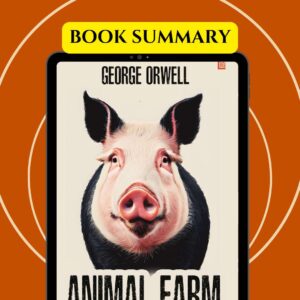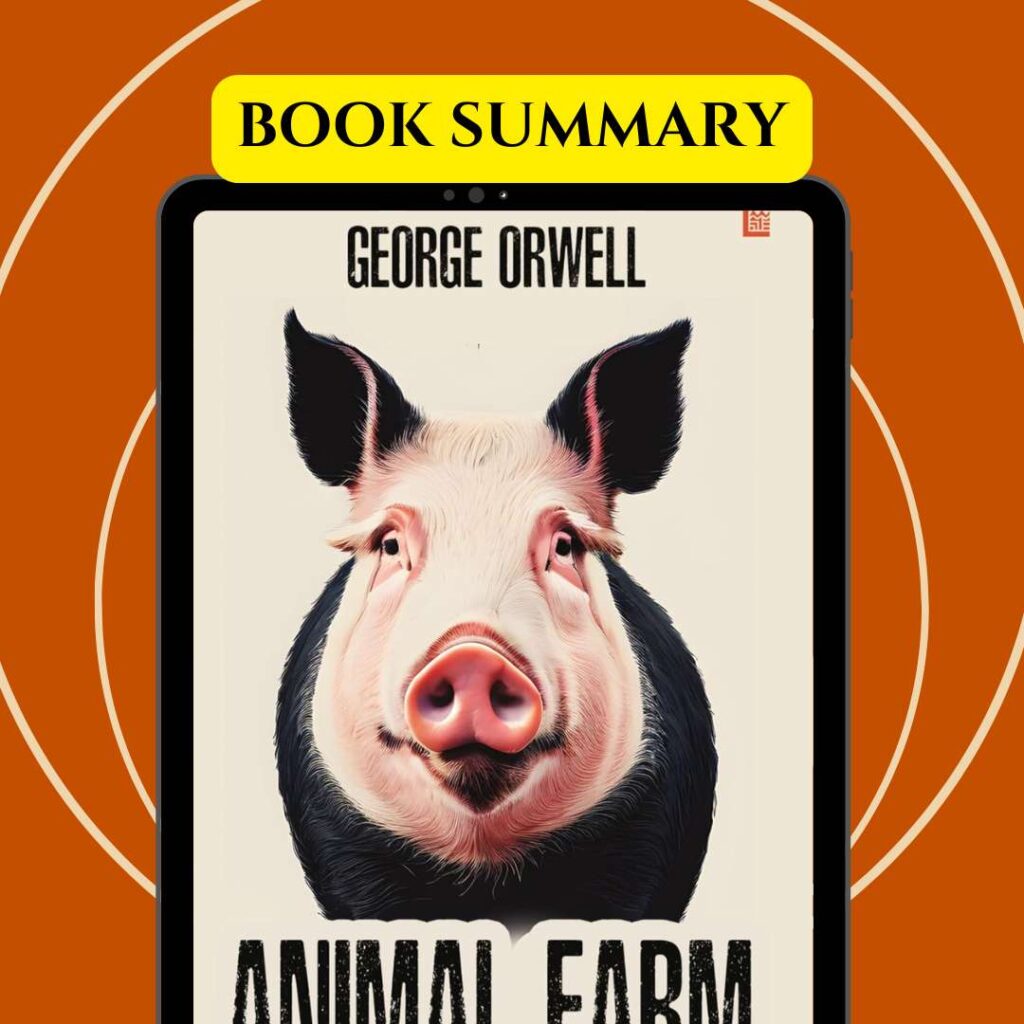Animal Farm Summary
In George Orwell’s classic novella Animal Farm, the story unfolds within the confines of a quaint English farm, exploring the implications of a revolutionary uprising led by the animals against their human oppressors.
Background and Setting of Animal Farm
Setting
The narrative is set on Manor Farm, a traditional English farm, which serves as the backdrop for the unfolding events.
Historical and Political Context
Written in 1945, following World War II, Orwell’s portrayal of the farm animals’ struggle reflects the broader socio-political landscape marked by the rise of totalitarian regimes and the erosion of democracy.

Table of Contents
Main Characters in Animal Farm
Napoleon
The ambitious and power-hungry Berkshire boar who emerges as the autocratic leader of Animal Farm, symbolizes Stalin and the concept of totalitarian rule.
Snowball
A spirited and intelligent pig who initially vies for leadership with Napoleon, embodying Trotsky and the idea of a revolutionary visionary.
Boxer
The loyal, hardworking cart-horse whose dedication and strength symbolize the exploited proletariat, showcasing themes of loyalty and sacrifice.
Squealer
The persuasive and manipulative pig who serves as Napoleon’s propagandist, represents the role of propaganda in sustaining oppressive regimes.
Plot Summary of Animal Farm
Rebellion against Mr. Jones
The animals of Manor Farm, led by Old Major’s stirring call for rebellion, overthrow their human owner, Mr. Jones, and establish their own society based on the principles of Animalism.
Rise of the Pigs
Initially driven by ideals of equality and liberation, the pigs, led by Napoleon and Snowball, gradually assume control, exploiting their authority for personal gain.
Twists and Turns
Internal power struggles, the manipulation of commandments, and alliances with humans culminate in a narrative teeming with betrayal, deception, and the ultimate perversion of the animals’ revolution.
Themes and Symbolism in Animal Farm (Word count: 700)
Themes
- Corruption: Orwell’s depiction of the pigs’ descent into corruption underscores the inherent pitfalls of power and authority.
- Power: The novel explores the dynamics of power and control, showcasing how absolute power can corrupt absolutely.
- Loyalty: Through characters like Boxer, the novel delves into the notion of blind loyalty and its exploitation by those in positions of authority.
Symbolism
- Animal Characters: Each animal represents a particular social class or archetype, illustrating the complexities of societal structures.
- Commandments: The changing commandments of Animalism symbolize the manipulation of ideology to justify oppressive practices.
Significance of Animal Farm in Literature
Impact and Relevance
Orwell’s allegorical portrayal of the Russian Revolution and its aftermath endows Animal Farm with enduring relevance, serving as a cautionary tale against totalitarianism and political manipulation.
Interpretation
The novel’s exploration of themes such as propaganda, corruption, and the cyclical nature of power remains a poignant commentary on the human condition and the fragility of democratic ideals.
Exploring the Depths of Animal Farm
Analysis of Animal Farm Characters
Animal Farm, penned by George Orwell Animal Farm, presents a vivid array of characters whose traits and actions form the core of the narrative. Let’s delve into a detailed analysis of some of the central figures:
Napoleon
- An embodiment of totalitarianism and power-hungry ambition
- Initially portrayed as a strategic thinker and leader, gradually turns despotic and manipulative
- Exploits situations to consolidate power and eliminate opposition, ultimately betraying the principles of the rebellion
Snowball
- Represents the idealistic vision of a utopian society on Animal Farm
- Charismatic and intelligent, advocating for literacy and progress
- Outmaneuvered by Napoleon in a power struggle, ultimately forced into exile
Boxer
- Symbolizes the dedicated and hardworking proletariat
- Known for his loyalty, strength, and dedication to the cause
- Tragically exploited and discarded by the pigs, highlighting the betrayal of the working class
Animal Farm vs. Historical Events
A compelling aspect of Animal Farm is its stark parallels to real historical events, shedding light on prevalent socio-political issues. Let’s draw comparisons between the novel and historical occurrences:
Totalitarian Regimes
- Animal Farm mirrors the rise of authoritarian regimes in history, particularly the Soviet Union under Stalin
- Orwell’s portrayal of Napoleon’s dictatorship reflects the tyrannical rule and suppression of dissent witnessed in totalitarian regimes
Political Corruption
- The manipulation and abuse of power by the pigs on Animal Farm draw striking similarities to the political corruption prevalent in various historical contexts
- Orwell’s critique extends beyond the farmyard, addressing the systemic flaws and moral decay inherent in political systems
Literary Techniques in Animal Farm
Orwell’s masterful use of literary devices enriches the narrative of Animal Farm, imbuing it with depth and resonance. Let’s explore the noteworthy techniques employed in the novel:
Satire
- Orwell employs satire to expose the absurdities and hypocrisies present in society
- Through comedic exaggeration and irony, he critiques human follies and societal injustices, offering a sharp commentary on human nature
Allegory
- Animal Farm serves as an allegory for the Russian Revolution and its aftermath
- Each character and event symbolizes historical figures and occurrences, allowing for a nuanced exploration of complex political ideologies and power dynamics
Symbolism
- Orwell skillfully utilizes symbolism to imbue objects and characters with deeper meaning
- The various animals and their actions represent broader themes and concepts, enhancing the allegorical nature of the narrative
Reception and Critiques of Animal Farm
Animal Farm has garnered diverse reactions from critics and readers, influencing discussions on politics and literature. Let’s assess the reception and critiques surrounding the novel:
Critical Acclaim
- Praised for its incisive social commentary and allegorical richness
- Recognized as a timeless classic that sheds light on the dangers of totalitarianism and propaganda
Controversies
- Animal Farm has faced controversies regarding its portrayal of historical events and political ideologies
- Debates persist on the interpretations of characters and themes, reflecting the enduring relevance and complexity of the novel
Educational Value of Animal Farm
A staple in educational curricula worldwide, Animal Farm serves as a potent tool for fostering critical thinking and dissecting societal structures. Let’s explore its educational significance:
Academic Use
- Widely taught in schools and universities for its historical allegory and literary merit
- Sparks discussions on power dynamics, social justice, and the consequences of unchecked authority
Value of Lessons
- Animal Farm imparts valuable lessons on leadership, propaganda, and the nature of revolution
- Encourages readers to question authority, recognize manipulation, and uphold the principles of democracy
Frequently Asked Questions (FAQs) on Animal Farm Summary
What is Animal Farm about?
Animal Farm is a novel by George Orwell that portrays the revolution of farm animals against their human owner and the subsequent events that lead to a totalitarian regime run by the pigs.
Who are the main characters in Animal Farm?
The main characters in Animal Farm include Napoleon, Snowball, Boxer, and Squealer, each representing different aspects of leadership, ideology, and manipulation.
What are the major themes in Animal Farm?
The major themes in Animal Farm revolve around power, corruption, propaganda, loyalty, and the dangers of oppressive regimes.
How does Animal Farm use allegory and symbolism?
Animal Farm uses allegory and symbolism to represent historical events and characters, such as Napoleon symbolizing Stalin and Snowball representing Trotsky.
What is the significance of Animal Farm in literature?
Animal Farm holds a significant place in literature due to its profound commentary on totalitarianism, political corruption, and the manipulation of power.
How do critics view Animal Farm?
Critics have praised Animal Farm for its impactful storytelling and social commentary, while some have raised concerns about its portrayal of political ideologies.
Is Animal Farm relevant today?
Yes, Animal Farm remains relevant today as it continues to serve as a cautionary tale about the dangers of unchecked power and the importance of remaining vigilant against oppressive regimes.
Conclusion
Through its vivid portrayal of animal characters and their struggle for equality, Animal Farm transcends its allegorical nature to deliver timeless messages about political power, corruption, and the dynamics of totalitarian systems. George Orwell’s masterpiece continues to resonate with readers around the world, emphasizing the importance of remaining vigilant in safeguarding democratic principles and challenging the status quo. As a literary classic, Animal Farm not only reflects historical contexts but also offers invaluable insights into the complexities of human nature and societal structures, leaving a lasting legacy in the realms of literature and social discourse.
Discover marketing services, interviews & publishing tools at SharingStories.



